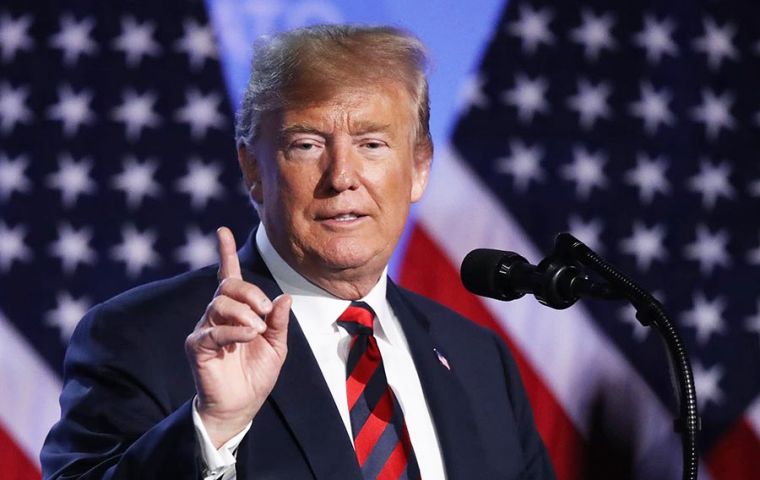MercoPress. South Atlantic News Agency
Trump pledges US$ 12bn to help farmers hit by trade war with China
 The president, speaking at an event in Kansas City on Tuesday, reaffirmed his support for tariffs and pledged that “farmers will be the biggest beneficiary.”
The president, speaking at an event in Kansas City on Tuesday, reaffirmed his support for tariffs and pledged that “farmers will be the biggest beneficiary.”  “This obviously is a short-term solution that will give President Trump time to work on a long-term trade policy,” said Sonny Perdue, US Secretary of Agriculture
“This obviously is a short-term solution that will give President Trump time to work on a long-term trade policy,” said Sonny Perdue, US Secretary of Agriculture  “This trade war is cutting the legs out from under farmers and the White House's 'plan' is to spend US$12 billion on gold crutches,” said Senator Ben Sasse
“This trade war is cutting the legs out from under farmers and the White House's 'plan' is to spend US$12 billion on gold crutches,” said Senator Ben Sasse The Trump administration on Tuesday said it will use a Great Depression-era program to pay up to US$ 12 billion to help U.S. farmers weather a growing trade war with China, the European Union and others that the president began. It is a clear signal the U.S. President Donald Trump is determined to stick with tariffs as his weapon of choice in the conflict.
The move meant to cushion the blow for a politically important constituency was met with broad criticism by many farmers and farm-belt lawmakers, including Republicans. Rural and agricultural states supported Trump by wide margins in the 2016 election.
Trump's trade policies have become central in several rural-state U.S. Senate races ahead of congressional elections in November.
The president, speaking at an event in Kansas City on Tuesday, reaffirmed his support for tariffs and pledged that “farmers will be the biggest beneficiary.”
“Just be a little patient,” Trump said.
The relief package is intended as a temporary boost to farmers as the United States and China negotiate over trade issues, officials said.
“This obviously is a short-term solution that will give President Trump time to work on a long-term trade policy,” said Sonny Perdue, the secretary of the U.S. Department of Agriculture. The aid will be financed through the USDA's Commodity Credit Corporation and will not require congressional approval, Perdue said.
The administration's action appeared to divide Republicans, with some praising the move and others troubled by what they view as the kind of widespread government-assistance program their party has traditionally opposed.
“This trade war is cutting the legs out from under farmers and the White House's 'plan' is to spend US$12 billion on gold crutches,” said Senator Ben Sasse, of Nebraska who frequently criticizes the president, a fellow Republican.
Farmers have been a particular target in the current clash over trade policy as other countries seek to retaliate for Trump's duties on Chinese goods as well as on steel and aluminum imports from the European Union, Canada and Mexico. Those affected economies have in turn targeted U.S. agricultural products, including soybeans, dairy, meat, produce and liquor.
The United States exported US$138 billion in agriculture products in 2017, including US$ 21.5 billion of soybeans, the most valuable export. China alone imported US$12.3 billion of U.S. soybeans last year, according to the USDA.
The size of the direct payments to farmers as a result of trade shortfalls would be unprecedented, said Scott Irwin, an agricultural economist at the University of Illinois.
“We have never compensated farmers directly on such a large scale for retaliatory tariffs,” Irwin said.
The news lifted shares of farm equipment companies on the prospect that farmers will have more money to spend on tractors and other farm gear. Deere & Co jumped 3.1%, while Caterpillar Inc gained more than 1% and AGCO Corp rose 0.6%.
Soybean futures, driven to a 10-year low in part by China's retaliatory tariffs, rose 1.2% and hit their highest in two weeks as traders bet farm aid would improve demand, reducing a current surplus supply.
Later this week, Trump will visit Iowa and Illinois, two other farm-belt states, as he seeks to shore up support for Republican candidates in the U.S. Midwest.




Top Comments
Disclaimer & comment rules-

-

-

Read all commentsHeh, you've got no answer to that then. Enjoy giving your tax dollars to the corporations.
Jul 26th, 2018 - 06:16 pm +2As if. The US spends tens of billions of dollars on subsidies every year, those farm lobbyists and big oil aren't going to give it up sucking on the government teat in a hurry. And you can't even agree to eliminate your tariffs with Canada. It's just another negotiating gimmick.
Jul 26th, 2018 - 02:53 pm +1I wonder how US taxpayers feel about spending $12bn on Trump's trade war, on top of the $25bn they so kindly donate to wealthy agri-business every year?
Jul 25th, 2018 - 11:01 am 0Commenting for this story is now closed.
If you have a Facebook account, become a fan and comment on our Facebook Page!